Vietnamese people have new pneumococcal vaccine, more opportunities to protect their health
The VNVC vaccination system has just officially launched and deployed vaccination against 15 strains of pneumococcal bacteria, opening up more opportunities to protect the health of children and adults in Vietnam against dangerous diseases caused by pneumococcal bacteria such as pneumonia, meningitis and sepsis.
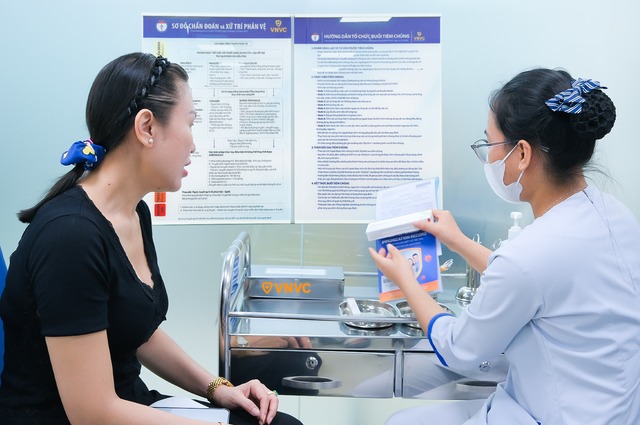 |
| The increase in the number of pneumococcal strains covered by the vaccine is a major step forward in protecting the public against dangerous strains of bacteria that were not covered by older vaccines. |
These strains are the leading cause of invasive pneumococcal diseases such as meningitis, sepsis, and pneumonia, as well as noninvasive diseases such as otitis media and sinusitis.
The vaccine is indicated for children from 2 months of age (as early as 6 weeks of age) and adults, significantly expanding the group of people who can be protected.
According to information from MSD, from 2022 to present, this vaccine has been approved in 65 countries and officially put into use in more than 40 countries worldwide .
According to Dr. Bach Thi Chinh, Medical Director of the VNVC Vaccination System, the appearance of pneumococcal vaccine 15 is an important addition to the arsenal of infectious disease prevention in Vietnam.
The doctor emphasized that full, timely vaccination and a combination of multiple generations of pneumococcal vaccines are recommended worldwide to increase optimal protection. Depending on age and local epidemiological conditions, the doctor will advise the most appropriate vaccine for each person.
She also said the increase in the number of pneumococcal strains covered by the vaccine was a major step forward in protecting the public against dangerous strains of bacteria that were not covered by older vaccines.
Sharing the same view, Dr. Phan Trong Giao, Medical Director of MSD Vietnam, said that MSD is proud of its long history in the field of preventing pneumococcal diseases, especially in young children.
“The pneumococcal vaccine 15 with its broad coverage and high immunogenicity will provide a solid foundation in protecting the health of Vietnamese people,” he shared.
The presence of pneumococcal vaccine 15 in Vietnam is a positive signal, showing that Vietnam is gradually approaching advanced medical solutions in the world to improve the quality of disease prevention and protect public health, especially in the context that infectious diseases are still a constant threat to children and the elderly.
Patient has two types of thyroid cancer at the same time due to delayed treatment
Ms. Tr., 60 years old, discovered that she had thyroid nodules two years ago but delayed treatment because she was afraid of surgery. When she returned for a check-up, both nodules had progressed to two different types of thyroid cancer.
Two years ago, Ms. Tr. was found to have two thyroid nodules in the right lobe of the thyroid gland, measuring 3.7×1.8 mm (TIRADS 3 - low risk of malignancy) and 4.1×3.7 mm (TIRADS 4 - suspected malignancy). Due to her old age and many underlying diseases such as coronary artery disease, hypertension, and diabetes, doctors recommended that she be monitored every 6 months instead of intervening early.
However, a year later, one of the two thyroid nodules grew rapidly, turning into TIRADS 5 - a high suspicion of malignancy. Although she was prescribed a fine needle aspiration (FNA) procedure, Ms. Tr. refused because she was afraid of surgery. She chose to use herbs and follow a traditional diet, continuing to delay treatment.
In March 2025, Ms. Tr. came to the hospital for a check-up. The ultrasound results showed that the thyroid nodule had significantly increased in size: the largest nodule was 7×5×5 mm, and both nodules were classified as TIRADS 5. In addition, the thyroid gland also had sponge-like nodules in the left lobe. At this time, Ms. Tr. agreed to perform FNA and was diagnosed with papillary thyroid cancer.
Faced with the rapidly progressing condition, specialists in Thoracic Surgery - Vascular, Endocrinology, Cardiology and Anesthesia and Resuscitation at Tam Anh General Hospital, Ho Chi Minh City, consulted and decided to perform total thyroidectomy.
According to Master, Doctor, Specialist Phan Vu Hong Hai, because the patient has many underlying diseases and is afraid of multiple surgeries, removing the entire thyroid gland from the beginning helps to treat thoroughly, avoid the risk of recurrence and reduce the possibility of having to have surgery again.
Master, Doctor, Doctor Pham Hung said that although thyroid surgery is not too complicated, it has many potential risks such as bleeding, hoarseness, loss of voice due to damage to the recurrent plexus nerve, hypocalcemia, infection, or most dangerously, thyroid storm, a condition in which vital signs skyrocket, which can be life-threatening.
For elderly patients with multiple underlying diseases like Ms. Truc, surgery requires close coordination between the anesthetist and the surgeon. Doctors have chosen the appropriate dose of anesthetic to ensure cardiovascular safety, while using an ultrasonic knife to accurately separate and stop bleeding, avoiding damage to nearby structures.
After more than two hours of surgery, the entire thyroid gland was completely removed. Ms. Truc recovered well, without any post-operative complications such as bleeding, infection or voice disorders, and was discharged from the hospital just one day after surgery.
Histopathological results confirmed that Ms. Tr. had two types of thyroid cancer at the same time: one was a common variant papillary cancer and the other was a follicular variant papillary cancer. Both tumors were still confined to the thyroid gland, had not spread, and had a very good prognosis.
Based on the guidelines of the American Thyroid Association (ATA 2015), with a small tumor size, no metastasis and the thyroid gland has been completely removed, Ms. Tr. is not required to receive radioactive iodine treatment after surgery. The patient will be monitored periodically every 3 - 6 months in the first 1 - 2 years to ensure that thyroid hormones are well controlled and to promptly detect recurrence if any.
Doctors also recommend that patients maintain a nutritious diet, eat on time, choose foods rich in calcium and avoid stimulants such as alcohol, beer, coffee, energy drinks, as well as spicy, greasy foods.
Burkholderia bacteria attack heart valve, woman almost lost her life
After months of high fever of unknown origin, Ms. L. (46 years old) was found to be infected with Burkholderia bacteria, causing a perforated aortic valve, leading to severe valve regurgitation and heart failure. The rare case surprised doctors.
According to Dr. Tran Vu Minh Thu, Head of Cardiology Department 2, Cardiovascular Center, who directly treated the patient, Burkholderia bacteria are gram-negative bacteria, commonly found in the natural environment, especially soil, mud and dirty water.
This bacteria can cause a series of serious diseases such as skin infections, pneumonia, meningitis, multi-organ abscesses and sepsis. However, cases of bacteria directly attacking the heart causing valve perforation like Ms. L's are extremely rare. "In more than 25 years of working, this is the first time I have encountered a case of severe heart valve regurgitation caused by Burkholderia bacteria," Dr. Thu shared.
Ms. L. started having a high fever of 38 - 39°C from March 2024, with mild difficulty breathing when exerting herself. Initially, she thought it was just a common fever and treated herself at home with antipyretics, but the symptoms did not go away. She was then tested at a hospital, and blood cultures showed the presence of Burkholderia bacteria. Despite being treated with antibiotics for a week, the fever persisted.
In June 2024, Ms. L. was transferred to a large hospital for further treatment. There, doctors performed an echocardiogram and in-depth tests, and found that she had infective endocarditis - a dangerous condition in which bacteria attack the inner lining of the heart. In particular, the bacteria created a large hole in the aortic valve, causing severe valve regurgitation leading to heart failure.
Ms. L. was treated with antibiotics for 6 consecutive weeks. Fortunately, her fever gradually decreased and disappeared, and her health recovered well over the next 8 months. However, due to severe heart valve damage, she was scheduled for aortic valve replacement surgery in March 2025.
After the surgery, tissue samples from the heart valve were sent for testing to assess the risk of reinfection. The results showed that there were no traces of Burkholderia bacteria, proving that the bacteria had been completely destroyed. After the surgery, Ms. L.'s heart function recovered positively, with the EF index (ejection fraction - a measure of heart contractility) returning to normal at over 50%. The patient was discharged after only one week.
Dr. Do Duy Long, Department of Internal Medicine and Cardiology, said that Burkholderia is a dangerous but little-known bacteria. People at high risk are often those who work in direct contact with soil, mud, and dirty water such as farmers, sanitation workers, or people with weakened immune systems (diabetes, chronic lung disease, liver and kidney disease, etc.). The bacteria can enter through open wounds, burns, or skin damage.
To prevent the disease, experts recommend that people avoid contact with contaminated soil and water, especially when there are open wounds.
Do not swim in rivers, lakes, or stagnant ponds during the rainy season or in unsanitary areas. Use protective gear (gloves, boots) when working in contact with dirty soil. Housewives should wear gloves when preparing food, and thoroughly disinfect knives and cutting boards, especially when handling raw foods.
People with chronic diseases need to control their underlying diseases well and closely monitor their health. If they have symptoms such as prolonged fever, cough, shortness of breath, muscle and joint pain, night sweats, unexplained fatigue, etc., they need to go to a medical facility for examination and necessary testing, avoiding being subjective with dangerous infectious diseases like Ms. L's case.
Source: https://baodautu.vn/tin-moi-y-te-ngay-105-nguoi-dan-viet-nam-co-them-vac-xin-phe-cau-moi-d281232.html


![[Photo] Ho Chi Minh City holds funeral for former President Tran Duc Luong](https://vphoto.vietnam.vn/thumb/1200x675/vietnam/resource/IMAGE/2025/5/24/9c1858ebd3d04170b6cef2e6bcb2019e)

![[Photo] Party and State leaders visit former President Tran Duc Luong](https://vphoto.vietnam.vn/thumb/1200x675/vietnam/resource/IMAGE/2025/5/24/960db9b19102400e8df68d5a6caadcf6)





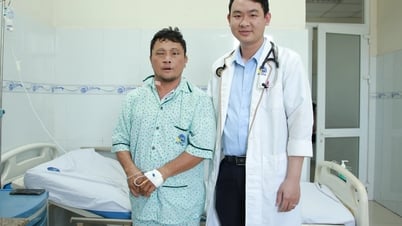

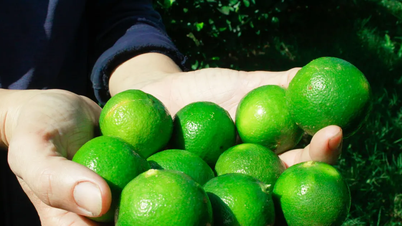

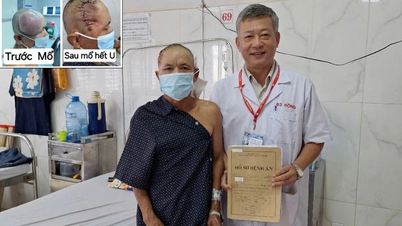

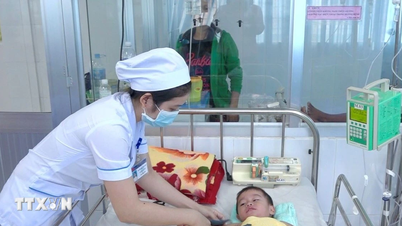














































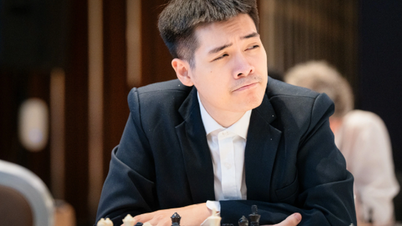































Comment (0)